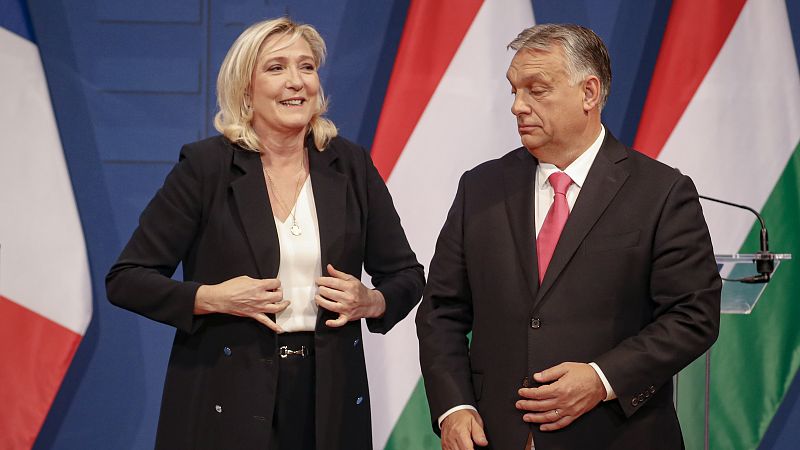Orbán’s EU far-right group woos new members

The new far-right alliance "Patriots for Europe", only launched two days ago, is already attracting suitors, reflecting a wider struggle for power among the EU's nationalists.
Announced on 30 June by radical parties from Hungary, Austria, and Czechia, the Patriots aim to become the largest hard-right group in the European Parliament, and there are certainly plenty of options to increase membership.
The day after, Portugal’s right-wing populist party Chega! was reported as being close to signing the new grouping’s manifesto.
That would potentially bring three more 2 MEPs into the alliance whose founders include Viktor Orbán’s Fidesz, Herbert Kickl's Freedom Party of Austria (FPÖ), and former Czech premier Andrej Babis's ANO.
The alliance is "growing at an incredible place, faster than anyone thinks now", said Viktor Orbán in an interview with Hungary's M1 TV channel on Monday night.
Italy’s far-right Lega appears to also be flirting with the idea, according to comments from its leader Matteo Salvini.
“We are evaluating all the documents, but I think that forming a large group that aspires to be the third-largest in the European Parliament may be the right way to go,” Salvini said on a radio show yesterday.**
Chega-Lega
Both Chega! and Lega currently sit with the nationalist Identity and Democracy (ID) group, the fifth largest in the Parliament, whose current cohort of 58 MEPs is dominated by 30 from Marine Le Pen’s National Rally.
But bringing the Italians and Portuguese on board still wouldn’t make the Patriots a formal group – the mechanism by which money and influence are distributed in the European Parliament.
With ten MEPs from Fidesz, seven from ANO, six from FPÖ, two from Chega!, and potentially eight from Lega, they could start with 33 MEPs, healthily above the threshold of 25 set by European Parliament rules.
But they’d still be two countries short of a requirement to house MEPs from seven EU members, and would also have to demonstrate that they share the same political affinity.
"Another four or five days and many people will be surprised," the Hungarian prime minister said in his interview, expecting the group will "very quickly become the third and then the second largest group" in the EU chamber.
Which parties might join next?
Other far-right and conservative parties are watching, but not committing.
The tipping point for Orbán’s Patriots would be convincing Poland’s Law and Justice party (PiS) to leave the European Conservatives and Reformists (ECR) group, where they share leadership with Giorgia Meloni’s Brothers of Italy.
The ECR’s constitutive group meeting was delayed to this week following internal negotiations, at the same time as rumours of Orbán’s attempt to unite nationalist parties started spreading.
Losing the 20 Polish MEPs would severely weaken the ECR, currently the third largest in the Parliament, and hamstring Meloni’s influence ahead of a key vote to reappoint Ursula von der Leyen as European Commission chief.
The Patriots group could impact the ID group still more. If the Netherlands’ Geert Wilders takes his six MEPs from ID to the Patriots, Belgium’s Vlaams Belang could follow.
Gerolf Annemans, Vlaams Belang’s most influential MEP, showed he was observing closely when he shared Orbán’s announcement on social media.
There’s also Alternative for Germany (AfD), whose 15 EU lawmakers are currently suspended from ID, and which has been in contact with the Patriots, according to parliamentary sources.
Even without PiS, a Patriots group supplemented from Germany, the Netherlands and Belgium could attempt to become the third largest group in the EU chamber—and possibly also force Le Pen, currently distracted by the prospect of victory in French elections, to join.
Not all of the independent MEPs may be interested, though. Slovakia’s SMER party is reportedly close to rejoining the socialist group, while Italy’s Five Star Movement has a different political trajectory, plus a longstanding squabble with Lega.
Others, such as the smaller Spanish anti-establishment grouping The Party’s Over, led by social media personality Alvise Pérez, might still be persuaded.
Defying the Meloni-Le Pen duopoly
The competition reflects tensions among Europe’s far-right parties.
Orbán currently has fewer MEPs than either Meloni or Le Pen, and this is a chance to gain leverage and present himself as the founding father of a new far-right alliance.
Constitutive meetings for both ID and ECR have been postponed, but the clock is ticking, with the deadline for group formation next Thursday (4 July).
This time limit is normally considered crucial, as group size determines access to key positions within the Parliament's structure.
Whether that reasoning still applies – given a cordon sanitaire in practice blocks the far-right from many influential posts – still remains to be seen.
Some national delegations in the European parties, including PiS, reportedly submitted a request to have the deadline extended to 8 July. A source in the far-right group ID confirmed to Euronews they had asked to push back their constitutive meeting, originally scheduled for tomorrow (3 July).
In his TV interview on Monday, Viktor Orbán said that his Patriots group will hold their inaugural meeting next Monday (8 July), beyond the Parliament's official deadline.
Today

